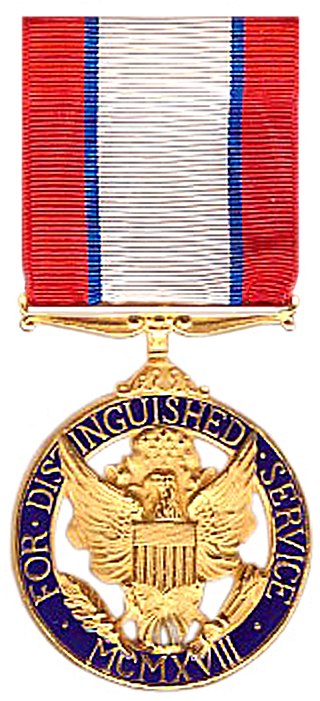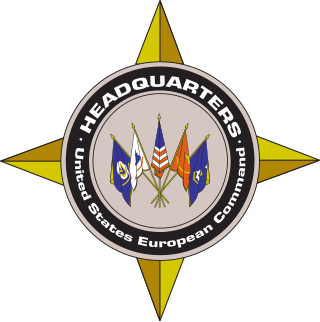
The Distinguished Service Medal (DSM) is a military decoration of the United States Army that is presented to soldiers who have distinguished themselves by exceptionally meritorious service to the government in a duty of great responsibility. The performance must be such as to merit recognition for service that is clearly exceptional. The exceptional performance of normal duty will not alone justify an award of this decoration.

The Legion of Merit (LOM) is a military award of the United States Armed Forces that is given for exceptionally meritorious conduct in the performance of outstanding services and achievements. The decoration is issued to members of the eight uniformed services of the United States as well as to military and political figures of foreign governments.
Lieutenant Commander is a commissioned officer rank in many navies. The rank is superior to a lieutenant and subordinate to a commander. The corresponding rank in most armies and air forces is major, and in the Royal Air Force and other Commonwealth air forces is squadron leader. It is roughly equivalent to the Corvette Captain rank in central European countries and the Captain 3rd rank rank in eastern European/CIS countries.
Commander is a common naval officer rank as well as a job title in many armies. Commander is also used as a rank or title in other formal organizations, including several police forces. In several countries this naval rank is termed frigate captain.

The Distinguished Flying Cross (DFC) is a military decoration of the United States Armed Forces. The medal was established on July 2, 1926, and is currently awarded to any persons who, after April 6, 1917, distinguish themselves by single acts of heroism or extraordinary achievement while participating in aerial flight. Both heroism and extraordinary achievement are entirely distinctive, involving operations that are not routine. The medal may be awarded to friendly foreign military members in ranks equivalent to U.S. Pay Grade of O-6 and below, in combat in support operations.
The title chief of staff identifies the leader of a complex organization such as the armed forces, institution, or body of persons and it also may identify a principal staff officer (PSO), who is the coordinator of the supporting staff or a primary aide-de-camp to an important individual, such as a president, or a senior military officer, or leader of a large organization.

The commanding officer (CO) or commander, or sometimes, if the incumbent is a general officer, commanding general (CG) or general officer commanding (GOC), is the officer in command of a military unit. The commanding officer has ultimate authority over the unit, and is usually given wide latitude to run the unit as they see fit, within the bounds of military law. In this respect, commanding officers have significant responsibilities, duties, and powers.
The Mediterranean Theater of Operations, United States Army (MTOUSA), originally called the North African Theater of Operations, United States Army (NATOUSA), was a military formation of the United States Army that supervised all U.S. Army forces which fought in North Africa and Italy during World War II.

The United States European Command (EUCOM) is one of the eleven unified combatant commands of the United States military, headquartered in Stuttgart, Germany. Its area of focus covers 21,000,000 square miles (54,000,000 km2) and 51 countries and territories, including Europe, The Caucasus, Russia and Greenland. The Commander of the United States EUCOM simultaneously serves as the Supreme Allied Commander, Europe (SACEUR) within NATO, a military alliance. During the Gulf War and Operation Northern Watch, EUCOM controlled the forces flying from Incirlik Air Base.

The Entente, or the Allies, were an international military coalition of countries led by France, the United Kingdom, Russia, the United States, Italy, and Japan against the Central Powers of Germany, Austria-Hungary, the Ottoman Empire, and Bulgaria in World War I (1914–1918).

A colonel in the United States Army, Marine Corps, Air Force and Space Force, is the most senior field-grade military officer rank, immediately above the rank of lieutenant colonel and just below the rank of brigadier general. Colonel is equivalent to the naval rank of captain in the other uniformed services. By law, an officer previously required at least 22 years of cumulative service and a minimum of three years as a lieutenant colonel before being promoted to colonel. With the signing of the National Defense Authorization Act of 2019, military services now have the authorization to directly commission new officers up to the rank of colonel. The pay grade for colonel is O-6.
In the United States Army, Marine Corps, Air Force and Space Force, major is a field officer above the rank of captain and below the rank of lieutenant colonel. It is equivalent to the naval rank of lieutenant commander in the other uniformed services. Although lieutenant commanders are considered junior officers by their services, the rank of major is that of a senior officer in the United States Army, the United States Marine Corps, and the United States Air Force.
In the United States Armed Forces, a lieutenant general is a three-star general officer in the United States Army, Marine Corps, Air Force, and Space Force.

The U.S. Army John F. Kennedy Special Warfare Center and School (SWCS) – known informally as "Swick" – primarily trains and educates United States Army personnel for the United States Army Special Operations Command and United States Special Operations Command, which includes Special Forces, Civil Affairs, and Psychological Operations personnel. Its purpose is to recruit, assess, select, train and educate the U.S. Army Civil Affairs, Psychological Operations and Special Forces Soldiers by providing training and education, developing doctrine, integrating force-development capability, and providing career management.
In the uniformed services of the United States, captain is a commissioned-officer rank. In keeping with the traditions of the militaries of most nations, the rank varies between the services, being a senior rank in the naval services and a junior rank in the ground and air forces. Many fire departments and police departments in the United States also use the rank of captain as an officer in a specific unit.
General of the Air Force (GAF) is a five-star general officer rank and is the highest possible rank in the United States Air Force. General of the Air Force ranks immediately above a general and is equivalent to General of the Army in the United States Army and Fleet Admiral in the United States Navy. The rank has only been held by one man, General Henry H. Arnold, who had served as head of the United States Army Air Forces during World War II. As the Air Force was a component of the Army instead of its own branch, the rank has never been held by a member of the Air Force.

Lieutenant commander (LCDR) is a junior officer rank in the United States Navy, the United States Coast Guard, the United States Public Health Service Commissioned Corps, and the National Oceanic and Atmospheric Administration Commissioned Officer Corps, with the pay grade of O-4 and NATO rank code OF-3. Lieutenant commanders rank above lieutenants and below commanders. The rank is also used in the United States Maritime Service. The rank is equivalent to a major in the United States Army, United States Air Force, United States Marine Corps, and United States Space Force.









